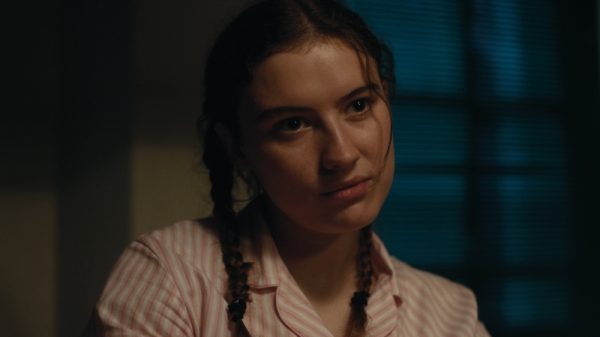Zebra Girl, 2021.
Directed by Stephanie Zari.
Starring Sarah Roy, Tom Cullen, Jade Anouka, Isabelle Connolly, Anna Wilson-Jones and Henry Douthwaite.
SYNOPSIS:
After a woman murders her husband, we delve into their past to discover the events leading up to her act of violence.
The initial omens for Zebra Girl were good ones. The movie begins with a tense set piece of creeping around in the dark, which culminates in Catherine (Sarah Roy) knifing her husband (Tom Cullen) through the eye socket. It’s a memorable image and one that feels primed to fire the starting pistol on a compelling psychological thriller. Sadly, what follows is nothing of the sort. It’s instead a failed attempt at gallows humour, which manages to play all of the old notes in stigmatising mental illness.
Catherine, it transpires, is supposed to be taking anti-psychotic medication after a violent event in her teenage years sparked by severe trauma. A series of flashbacks follow the immediate aftermath of that event, with Isabelle Connolly as the younger Catherine, while we also trace the romance between Catherine and Cullen’s Dan – from awkward first date to marriage and, subsequently, a pregnancy. Meanwhile, the story jumps back to Catherine and friend Anita’s (Jade Anouka) attempts to dispose of Dan’s body.
The movie started life as an Edinburgh Fringe play by Derek Ahonen, who adapted the material for the big screen along with director Stephanie Zari and star Roy. At times, the finished product feels a little like a slightly ropey regional theatre production, jumping back and forth through its timelines and hamstrung by a handful of very mannered and borderline parodic performances. Often, it’s unclear whether the movie wants you to laugh or not – and that makes it a rather awkward sit.
Roy doesn’t quite hit the target in the lead role, boasting the slightly stilted energy of an early-career Keira Knightley and struggling to modulate some of the spikier one-liners she is given. It takes a certain force of performance to make “we need to dismember him” work as a laugh-out-loud gag, and Roy can’t quite manage it. Cullen, meanwhile, is given very little texture by virtue of the movie framing Dan solely through the protagonist’s unreliable narrator lens. Connolly, thankfully, is a bright spot as she brings a puckish malevolence to her teenage take on Catherine – a performance which seems to have been parachuted in from a much better film.
But the most troubling aspect of the movie is in its willingness to draw a direct line from mental illness to violence. It falls back on the “didn’t take her meds” trope and strikes an awkward balance between its desire to inject humour and its serious themes. Much like the ickier corners of Joker, Zebra Girl appears to be in a fight with its own tone – tossing in over-the-top genre excesses, while also trying to handle issues and ideas which deserve and indeed require a more sensitive touch.
The movie tumbles into a final act of reversals and revelations, but none are particularly surprising or serve to illuminate the story in any way. Indeed, after a soup of disappointing stabs at comedy and a laughably overwrought, ominous musical score, the movie rather limps to its closing credits. Whatever it was trying to say, the message got lost amid creaky attempts at stylistic trickery and storytelling that was at best a bit dull and, at worst, terribly distasteful.
Flickering Myth Rating – Film: ★ / Movie: ★ ★
Tom Beasley is a freelance film journalist and wrestling fan. Follow him on Twitter via @TomJBeasley for movie opinions, wrestling stuff and puns.















